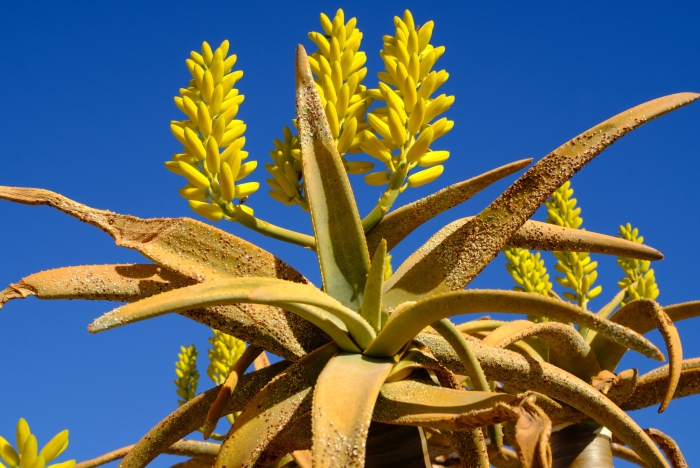Quiver Tree
(Aloidendron dichotomum)
Quiver Tree (Aloidendron dichotomum)
/
/

Nick Helme
CC BY-SA 4.0
Image By:
Nick Helme
Recorded By:
Copyright:
CC BY-SA 4.0
Copyright Notice:
Photo by: Nick Helme | License Type: CC BY-SA 4.0 | License URL: http://creativecommons.org/licenses/by-sa/4.0/ | Rights Holder: Nick Helme | Publisher: iNaturalist | Date Created: 2023-05-03T16:10:02-07:00 |























Estimated Native Range
Summary
Aloidendron dichotomum, commonly known as the Quiver Tree, is a tall, slow-growing succulent native to the arid regions of the Northern Cape province of South Africa and parts of Southern Namibia, particularly in rocky outcrops and desert plains. It can reach up to 30 feet in height and is characterized by a thick, branching stem that resembles a tree. The plant’s smooth, light bark and blue-green leaves are distinctive features. The Quiver Tree blooms with bright yellow flowers typically in the Southern Hemisphere’s winter months, from June to July, which are showy and attract various pollinators.
The Quiver Tree is valued for its striking architectural form and is often used as a focal point in xeriscapes and rock gardens. It is also a popular subject for photography and is considered a flagship species for conservation in its native habitat. In cultivation, it requires minimal maintenance, provided it is planted in well-drained sandy soils and exposed to full sun. While it is drought-tolerant, it is sensitive to overwatering and frost. The plant is not known for significant disease issues, but root rot can occur if drainage is poor. It has no aggressive roots or notable invasiveness issues. The Quiver Tree is also culturally significant, as the San people have traditionally used its hollowed branches to craft quivers for their arrows.CC BY-SA 4.0
The Quiver Tree is valued for its striking architectural form and is often used as a focal point in xeriscapes and rock gardens. It is also a popular subject for photography and is considered a flagship species for conservation in its native habitat. In cultivation, it requires minimal maintenance, provided it is planted in well-drained sandy soils and exposed to full sun. While it is drought-tolerant, it is sensitive to overwatering and frost. The plant is not known for significant disease issues, but root rot can occur if drainage is poor. It has no aggressive roots or notable invasiveness issues. The Quiver Tree is also culturally significant, as the San people have traditionally used its hollowed branches to craft quivers for their arrows.CC BY-SA 4.0
Plant Description
- Plant Type: Tree
- Height: 15-30 feet
- Width: 10-15 feet
- Growth Rate: Slow
- Flower Color: Yellow
- Flowering Season: Summer
- Leaf Retention: Evergreen
Growth Requirements
- Sun: Full Sun
- Water: Low
- Drainage: Fast
Common Uses
Drought Tolerant, Low Maintenance, Rock Garden, Showy Flowers
Natural Habitat
Native to rocky outcrops and desert plains in the arid regions of the Northern Cape province of South Africa and parts of Southern Namibia
Other Names
Common Names: Kokerboom
Scientific Names: , Aloidendron dichotomum, Aloe dichotoma, Aloe dichotoma var. montana, Aloe montana, Aloe ramosa, Rhipidodendrum dichotomum,
GBIF Accepted Name: